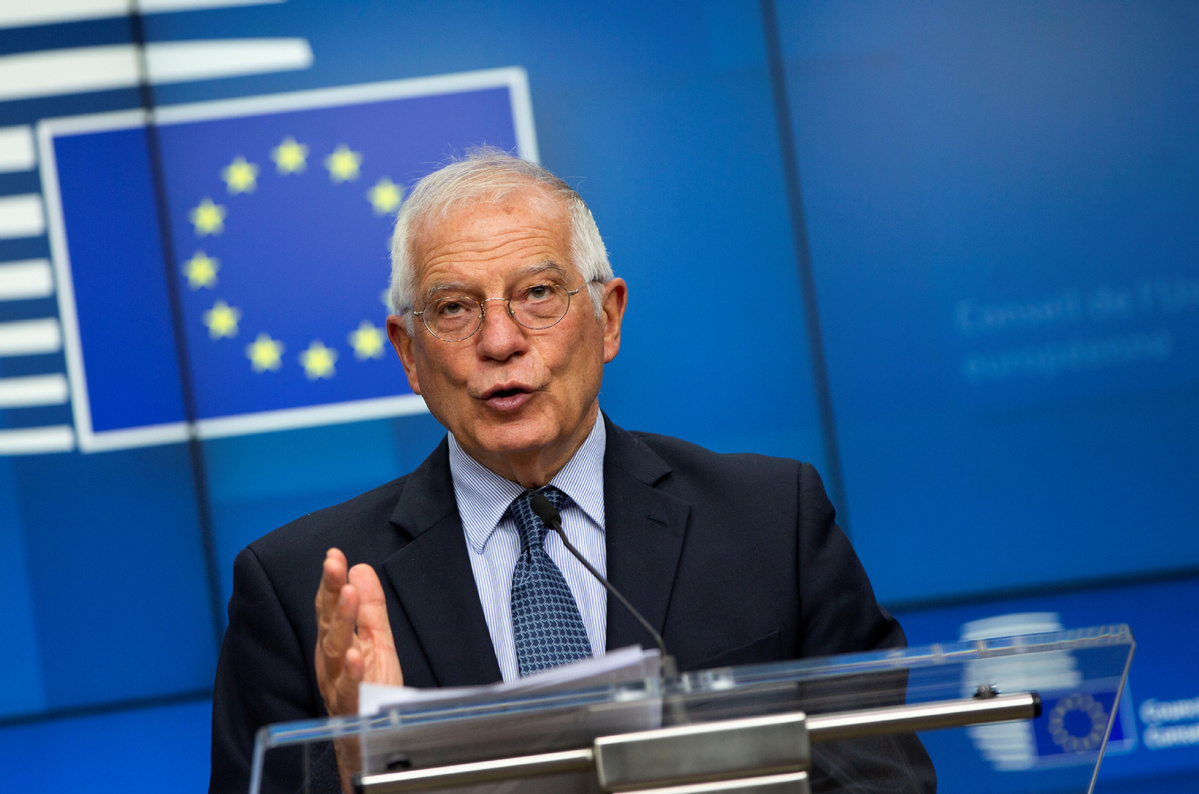Abandonment of global health agency, flaws in Middle East peace plan cited

Josep Borrell, European Union foreign policy chief, speaks at a news conference after a meeting of EU foreign ministers by videoconference at the European Council building in Brussels, Belgium June 15, 2020. (Photo: Agencies)
European Union foreign ministers voiced their concern on Monday over what they have called the US' flawed Middle East peace plan and its abandoning of multilateralism and the World Health Organization.
After a videoconference between foreign ministers of EU member states and US Secretary of State Mike Pompeo, EU foreign policy chief
said the EU foreign ministers underlined that there is currently no better example of the need for international cooperation than the health crisis caused by the COVID-19 pandemic.
He said that is why the EU has regretted the US announcement of its intention to withdraw from the WHO.
"We expect that this decision could be reconsidered, because global problems need global solutions and multilateral tools," Borrell said at a news conference after the meeting.
"Multilateral cooperation is needed more than ever. It is in big demand and short supply."
EU foreign ministers also urged the US to join a new effort to revive the long-stalled peace talks between Israel and the Palestinians. They dismissed US President Donald Trump's Middle East plan as the basis for any international process.
Trump's plan was rejected by the Palestinians for not respecting their demands and allowing Israel to annex big chunks of the occupied West Bank.
"We were also clear about the consequences of possible annexation for the prospects of a two-state solution, but also for regional stability," he said.
Borrell said the process has to be pursued on the basis of existing internationally agreed parameters, and the EU has said repeatedly that the US plan does not respect the parameters.
In a blog on Sunday, Borrell described the transatlantic relationship as vital for Europe. "But it is also facing stresses and strains. The Trump administration has taken unilateral decisions with which we do not always agree," he wrote.
EU leaders have voiced their frustrations over US attacks on global rules and norms in recent years, such as quitting the United Nations-brokered Paris Agreement on climate change, the Iran nuclear deal and the Intermediate-Range Nuclear Forces and Open Skies treaties.
Europe not picking sides
At the news conference, Borrell said that they also exchanged views on China, including what he called China's "growing assertiveness on many fronts". He said they did not have time to go into detail and he suggested a bilateral meeting on China later.
China and EU leaders will meet next week for their 22nd summit via a videoconference due to COVID-19.Borrell said the two sides are continuing negotiations in order to reach some results for bilateral cooperation for the next five years.
In the Sunday blog, Borrell said that the EU does not want to be caught having to pick sides between China and the US but instead would use its own interests and values as a compass.
He said the 27 member states have different views on how to manage the relationship, saying "some push for alignment, others for equidistance".
French President Emmanuel Macron said on Sunday that he would work to build a Europe that was less dependent on China and the US.
"China is playing an ever-growing role in global politics, and we have great interest in working together on the many issues where its role is essential, from pandemic recovery to climate change and sustainable connectivity," he wrote. "All this and more forms a big, positive agenda for EU-China cooperation."
A former Spanish foreign minister, Borrell said that EU also wants to work with China on issues in which they have not reached agreement but where good faith negotiations can produce good outcomes for both sides. He said he hoped the two sides would soon wrap up their talks on market access and a bilateral comprehensive agreement on investment.
Germany, which will assume the EU's presidency in July, said in a draft policy plan that "we want to develop cooperation with China and work for more reciprocity in all policy areas," Reuters reported on Monday.
Borrell described EU-China relations as "unavoidably complex and multifaceted".


